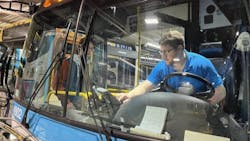TCAT Board of Directors approves purchase of five diesel replacement buses, appoints Matthew Rosenbloom-Jones as new GM
The Tompkins Consolidated Area Transit (TCAT) Board of Directors approved the purchase of five diesel replacement buses and the appointment of Matthew Rosenbloom-Jones as the agency’s general manager (GM).
Diesel replacement buses
The purchase of five diesel replacement buses will help strengthen TCAT’s fleet after safety concerns prompted the agency in mid-March to take its seven Proterra battery-electric buses out of service indefinitely. The board also approved a local funds match to support a grant application to help fund the purchase of two hybrid electric buses.
The agency notes the diesel bus purchase will delay its goal for a zero-emissions fleet by 2035 due to publicly funded buses needing to be in service for at least 12 years. However, TCAT Board members stressed they still aspire to green the now 53-bus fleet as much – and as soon – as possible. In addition to the five new diesels, which will be manufactured by Gillig, TCAT will be procuring six battery-electric 40-foot buses and four micro-transit battery electric vans, for which funding has already been approved. The diesel bus purchase will be funded by the state of New York’s Modernization Enhancement and Accelerated Transit Capital programs.
The TCAT Board says that for now, it is imperative that TCAT has enough road-ready buses to meet service levels. During the past four years, a combination of driver shortages and equipment failure afflicting both diesel and battery-electric buses have forced TCAT to curtail service, causing disruptions and inconvenience to riders, some of whom have given up on public transportation.
Rosenbloom-Jones
Rosenbloom-Jones was named TCAT GM on April 12 after serving the role on an acting basis for six weeks. The appointment by the TCAT Board ended a four-month nationwide search to replace former GM Scott Vanderpool, who retired on March 1. In February, the board named Rosenbloom-Jones as the acting GM, effective March 2, until the national recruitment could be completed.
TCAT Board members and staff said they were impressed with Rosenbloom-Jones’ depth of knowledge, which enabled him to quickly grasp TCAT’s persistent challenges, including driver shortages and maintenance issues, soon after he joined TCAT in early January as its service development manager, responsible for system-wide planning.
“We’ve had candidates with stellar resumes and backgrounds vying to become TCAT’s new GM but Matthew clearly rose to the top. Ever since his arrival here, he has consistently demonstrated leadership and excellent communication skills. What clinched the selection for us was his ability to clearly articulate practical plans to help TCAT to rebuild service and ridership to pre-pandemic levels. He did so with poise during arduous question-and-answer sessions, one of which included a conference room full of both board members and TCAT staff with tough questions for him,” said TCAT Board Chairperson Deborah Dawson.
Rosenbloom-Jones most recently worked as a transit director for a Wisconsin transit agency. Before that, he was a transportation specialist in the city of Bowie, Md., and manager of scheduling for a Kentucky transit authority. Earlier in his career, he held similar positions for agencies in Minnesota, Long Island and Rochester, N.Y. In addition to earning a master’s degree in regional planning, Rosenbloom-Jones also has a Bachelor of Arts degree in political science and urban studies from Canisius College, Buffalo, and a Master of Arts degree in history from Aberystwyth University in Wales.
In addition to having proven experience in transit planning, scheduling, operations and management, Rosenbloom is also trained and licensed as a transit driver, a skill he pursued several years ago so that he could fully understand drivers’ perspectives and learn about what they encounter day in and day out while serving the public.
“I am honored to be chosen as TCAT’s general manager and feel fortunate that TCAT has a dedicated team of bus operators, maintenance crew and administrative staff and in a community that stands behind public transportation. Before the pandemic, TCAT was known in the industry as one of the best systems of its size on the continent with an annual ridership in the 4 million range, or about 35 percent more than we currently report. It will take time, but with well-thought-out capital spending plans for new buses and solid operational and administrative strategies and teamwork, I am confident we will get there,” said Rosenbloom-Jones.
About the Author
Brandon Lewis
Associate Editor
Brandon Lewis is a recent graduate of Kent State University with a bachelor’s degree in journalism. Lewis is a former freelance editorial assistant at Vehicle Service Pros in Endeavor Business Media’s Vehicle Repair Group. Lewis brings his knowledge of web managing, copyediting and SEO practices to Mass Transit magazine as an associate editor. He is also a co-host of the Infrastructure Technology Podcast.


